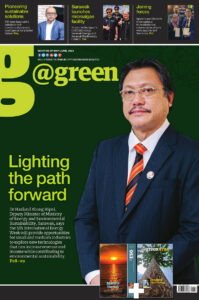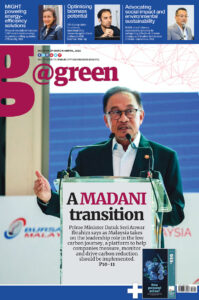Authority has engaged public and private stakeholders through implementation of sustainable energy programmes
The past decade has been an exciting journey for Sustainable Energy Development Authority (SEDA) Malaysia, filled with unprecedented opportunities, challenges and successes in supporting the government to realise its aspirations.
SEDA Chairman Lukanisman Awang Sauni said the Authority’s critical role was to administer and manage the implementation of the Feed-in Tariff (FiT) mechanism, mandated under the Renewable Energy Act 2011 [Act 725].
SEDA celebrated its 10th anniversary in September. Established in 2011, SEDA is a statutory body tasked to drive and support the nation’s sustainable energy (S E) agenda.
Growth in the past decade
The growth of renewable energy, he said, could easily be tracked by the establishment of several policies such as the Fifth-Fuel policy and Renewable Energy Act (RE Act 2011) and later the SEDA Act 2011, which have become an essential catalyst to the generation of RE in Malaysia.
For example, the implementation of the FiT programme in Malaysia, under the RE Act 2011, had benefitted 10,344 entities.
Lukanisman also shared that several RE projects developments supported under the FiT programme, proven to provide sustainability and
socio-economics benefits to the nation, were also recognised and successfully selected as the winner during both National Energy Award (NEA) and ASEAN Energy Award (AEA).
In 2016, SEDA was also mandated as the implementing agency for Net Energy Metering (NEM) mechanism to accelerate the rooftop solar industry. And as of the end of 2020, the quota of 500MW has been fully taken up, which benefits over 5,000 applicants.
“Looking at the overwhelming demand for this programme, the
Ministry of Energy and Natural Resources (KeTSA) has announced the launching of NEM 3.0 in January 2021 to facilitate the market growth,” said Lukanisman.
In addition to playing a pivotal role in implementing the FiT and NEM, SEDA has expanded its scope of services in human capital investment within both the RE and energy efficiency (EE) sectors.
“These include addressing the competency gap for solar PV technology and conducting workshops on biomass, biogas and small hydro as well as developing and implementing energy management and efficiency training and renewable energy training.
“All of which successively led to numerous collaborations and introduction of SEDA’s SE programmes and initiatives that are in place today,” he explained.
Malaysia on track
According to Lukanisman, Malaysia’s on the right track to achieve its national target of 31 per cent by 2025 and 40 per cent by 2035. It is based on the current trajectory of 23 per cent installed mix capacity as of 2020.
“With the ongoing programmes such as FiT, NEM, Large Scale Solar (by the Energy Commission), among others, we are optimistic about attaining the set targets.
“Malaysia is progressively developing the growth of RE and yet at the same time cautiously ensuring the Energy Trilemma of environment, affordability and system stability to be addressed in tandem with one another.
“Currently, the deployment of RE projects in operation has able to operate within the obligations under the respective commercial agreement i.e. Power Purchase Agreement) without the need for operational measures such curtailment or impose significant impact to electricity tariff.
“The cautious measures allow the policy-makers to gain insights on the trending and implication of RE growth in other developed countries, enabling the right policy that suits local context without disrupting the reliability of electricity supply industry and
end-users,” added Lukanisman.
Engaging with private sectors
As part of SEDA’s role in exploring more potentials of RE technology and new resources, it continuously engages with private sectors proposing new technologies and facilitating them within the current context and way forward.
SEDA’s quarterly trade journal, dubbed as the Sustainable Energy Malaysia (SEM), also serves as a platform for SEDA to interact with its stakeholders from private sectors on the latest developments of Malaysia’s SE sector and alert them on the available services extended by the Authority.
“Also, the FiT mechanism, enabled by the RE Act [Act 725], was introduced to provide business confidence and security among industry players. It includes private investors, developers and bankers in the domestic market.
“Since its implementation, the sector witnessed a significant growth of RE mix in the grid energy distribution.”
Throughout the years, SEDA effectively engaged all stakeholders from both public and private sectors through sustainable energy programmes, especially during unprecedented and challenging times.
Post-pandemic outlook
Lukanisman noted that due to the Covid-19 pandemic, SEDA, as the implementing agency of numerous RE and EE policies and programmes, did not have the luxury to keep its activities and operations on hold as it was crucial for Malaysia’s RE agenda.
“The outlook for the RE industry remains challenging, but the prospects are bright as the world steps up its energy transition efforts to address climate change and greenhouse gas emission issues.”
Following the recent announcement by Prime Minister Datuk Seri Ismail Sabri Yaakob that Malaysia was committed to Carbon Neutral by the earliest 2050, Lukanisman said: “In realising the aspiration, concerted efforts by relevant sectors including urban development, transportation and total primary energy consumption at large need to be addressed.
“A more cross-sectoral engagement and initiatives are in time to collectively deliver sectoral’s aspirations towards common goals – Carbon Neutral.”
Part 2: https://revonmedia.com/2022/01/10/roadmap-to-address-the-energy-trilemma/









